SWK172 Case Study: Migrant Workers, Social Justice & Anti-Oppression
VerifiedAdded on 2023/03/31
|12
|687
|134
Case Study
AI Summary
This case study analysis focuses on the challenges faced by migrant workers in Australia, particularly regarding employment discrimination and lack of equal opportunities. It identifies key issues such as racial and ethnic discrimination, marginalization, and the resulting loss of hope among migrants. The analysis emphasizes the importance of justice policy, anti-oppressive practice, and the role of social work in addressing these issues. It suggests strategies for empowering migrants, promoting social fairness, and advocating for policy changes to combat discrimination and unemployment. The analysis also highlights the need for government intervention, enforcement of human rights, and ethical values to ensure equity and well-being for migrant communities. The document is available on Desklib, a platform offering study tools and solved assignments for students.
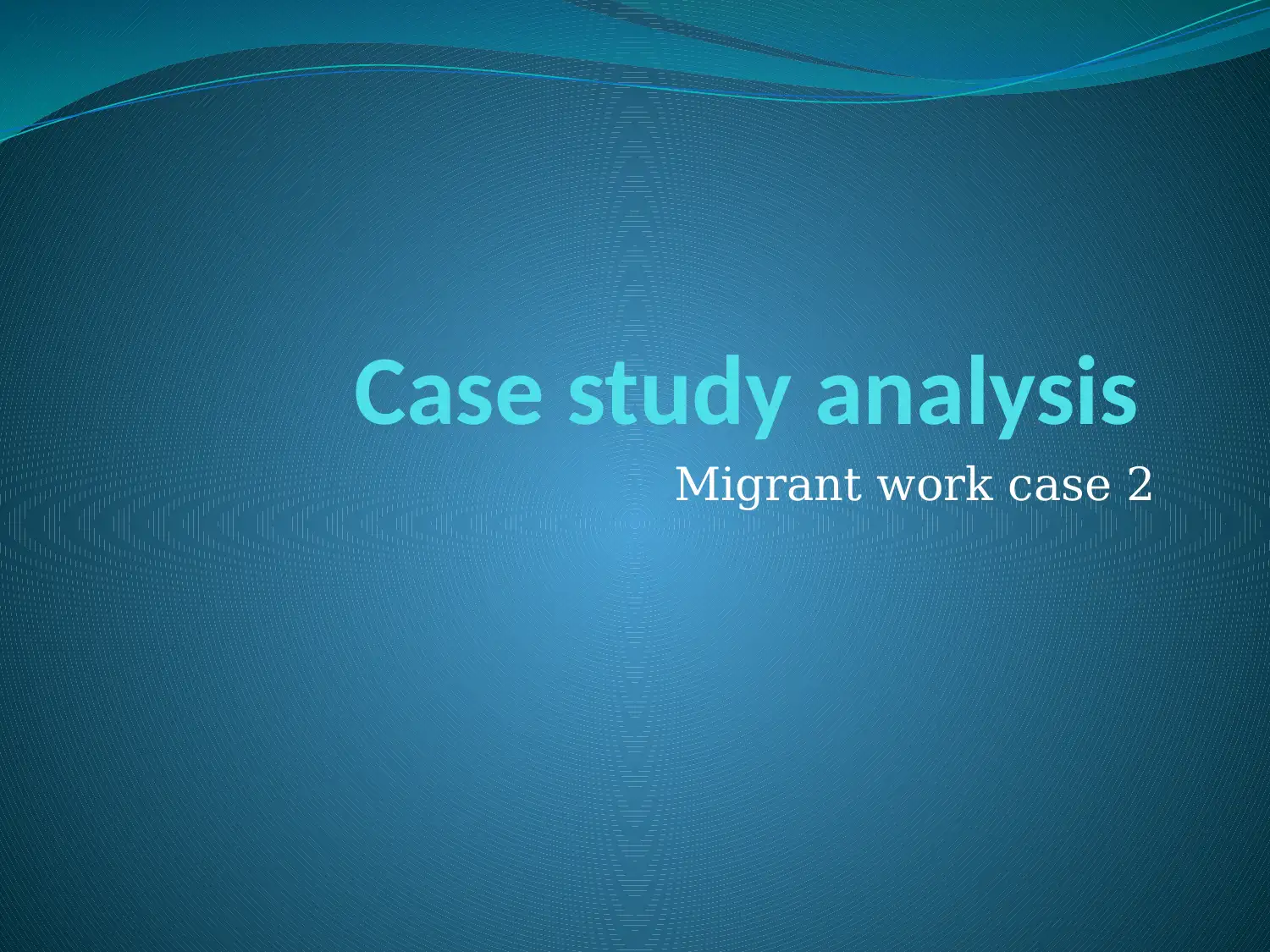
Case study analysis
Migrant work case 2
Migrant work case 2
Paraphrase This Document
Need a fresh take? Get an instant paraphrase of this document with our AI Paraphraser
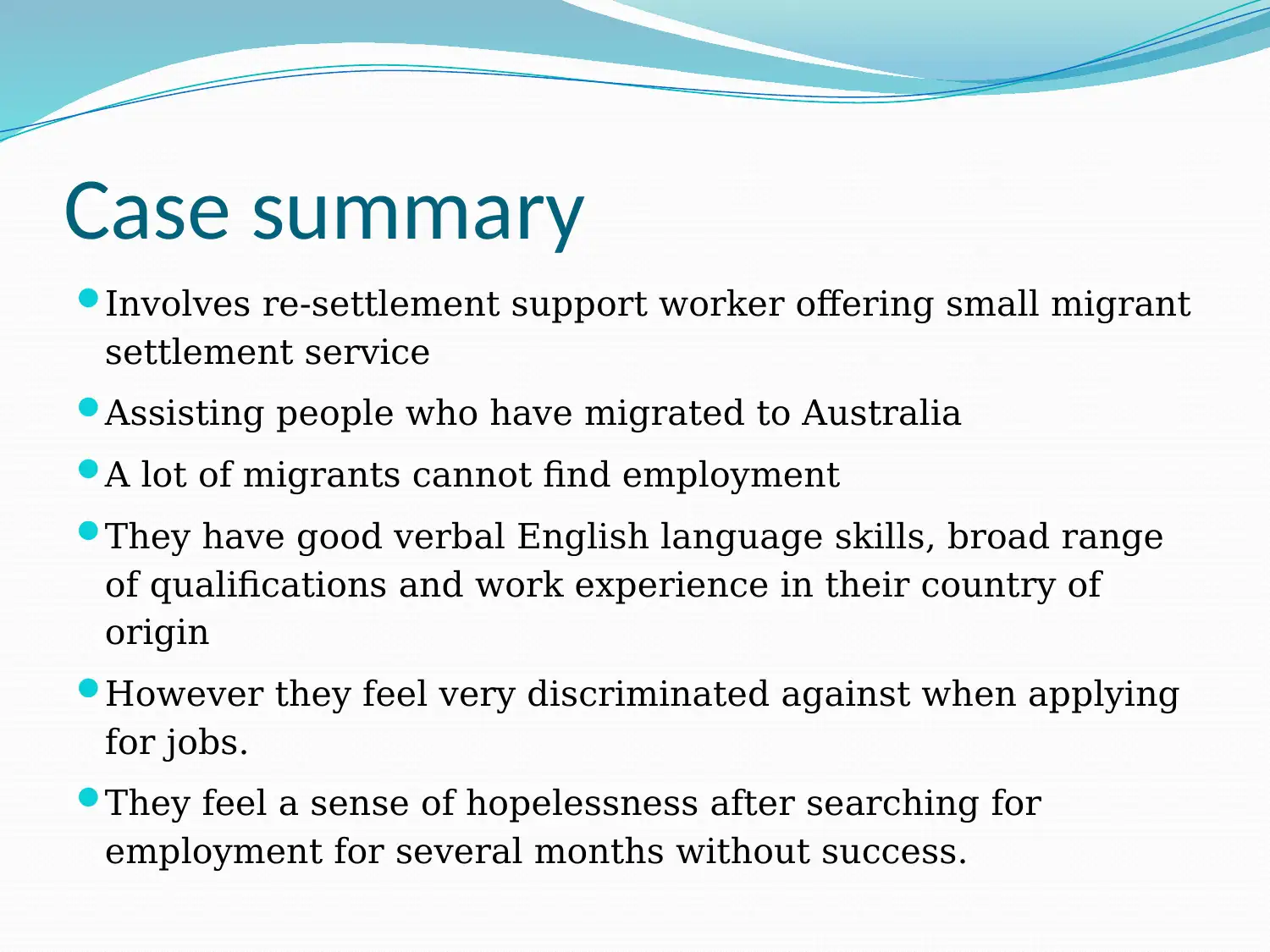
Case summary
Involves re-settlement support worker offering small migrant
settlement service
Assisting people who have migrated to Australia
A lot of migrants cannot find employment
They have good verbal English language skills, broad range
of qualifications and work experience in their country of
origin
However they feel very discriminated against when applying
for jobs.
They feel a sense of hopelessness after searching for
employment for several months without success.
Involves re-settlement support worker offering small migrant
settlement service
Assisting people who have migrated to Australia
A lot of migrants cannot find employment
They have good verbal English language skills, broad range
of qualifications and work experience in their country of
origin
However they feel very discriminated against when applying
for jobs.
They feel a sense of hopelessness after searching for
employment for several months without success.
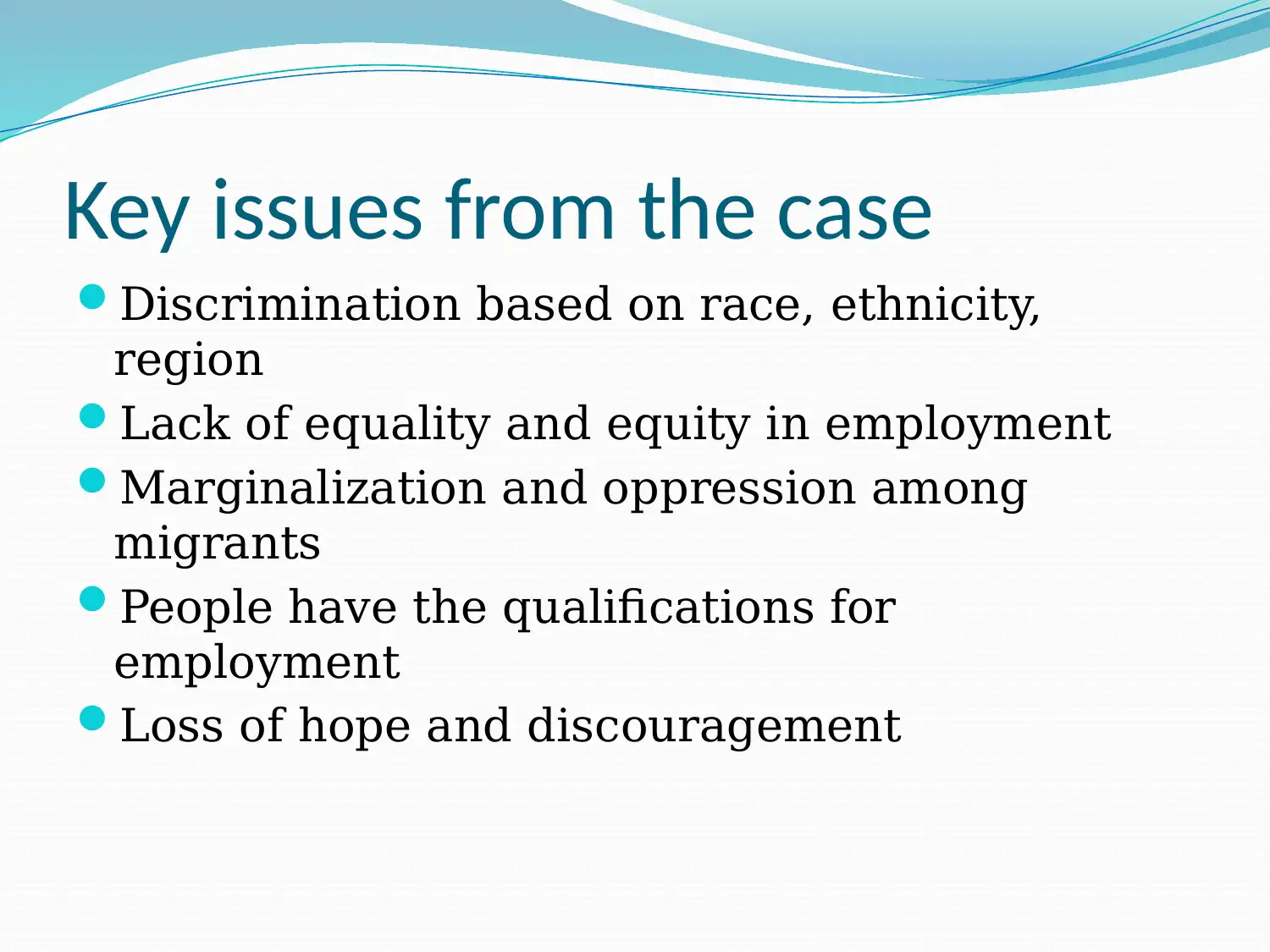
Key issues from the case
Discrimination based on race, ethnicity,
region
Lack of equality and equity in employment
Marginalization and oppression among
migrants
People have the qualifications for
employment
Loss of hope and discouragement
Discrimination based on race, ethnicity,
region
Lack of equality and equity in employment
Marginalization and oppression among
migrants
People have the qualifications for
employment
Loss of hope and discouragement
⊘ This is a preview!⊘
Do you want full access?
Subscribe today to unlock all pages.

Trusted by 1+ million students worldwide
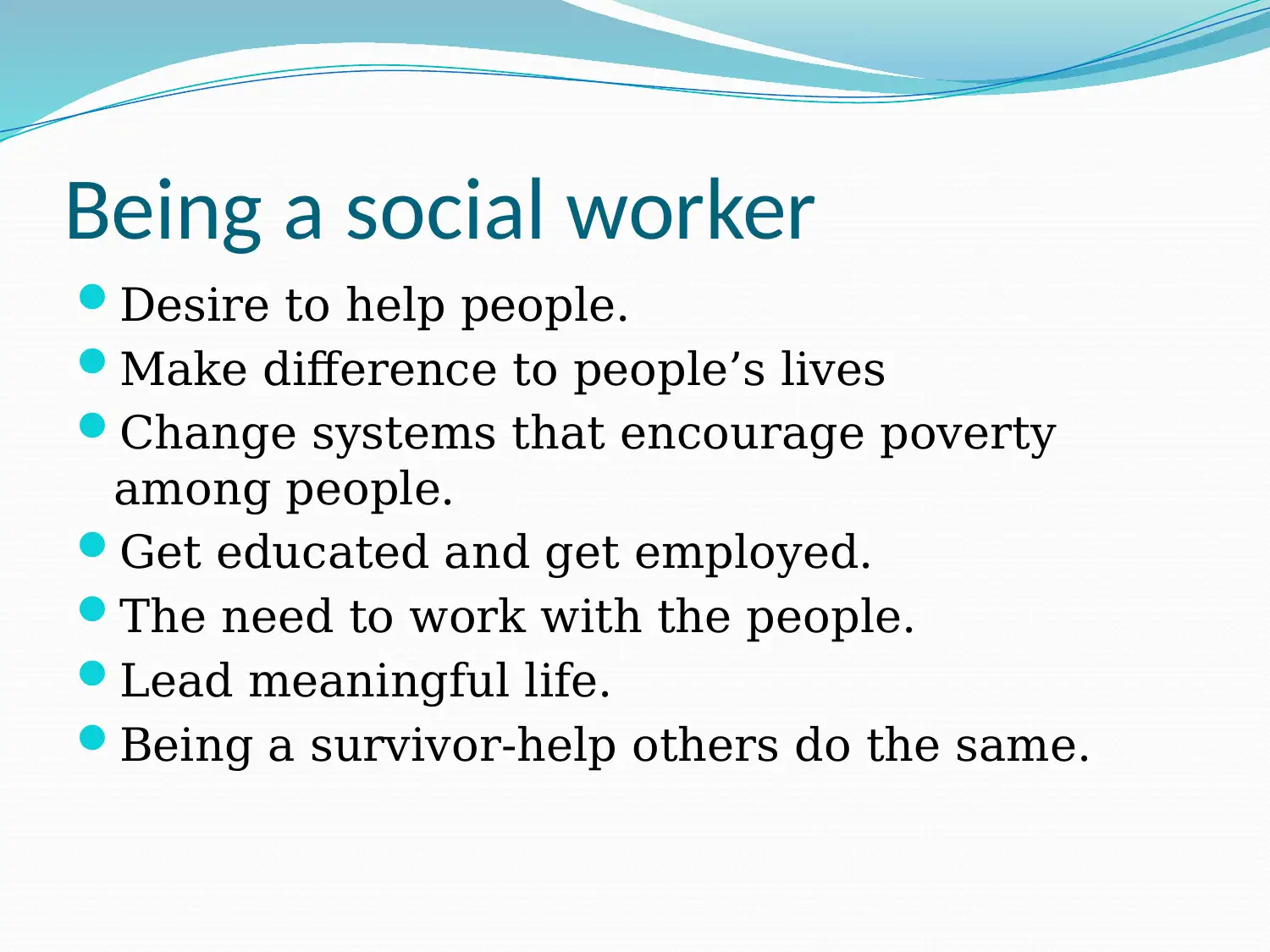
Being a social worker
Desire to help people.
Make difference to people’s lives
Change systems that encourage poverty
among people.
Get educated and get employed.
The need to work with the people.
Lead meaningful life.
Being a survivor-help others do the same.
Desire to help people.
Make difference to people’s lives
Change systems that encourage poverty
among people.
Get educated and get employed.
The need to work with the people.
Lead meaningful life.
Being a survivor-help others do the same.
Paraphrase This Document
Need a fresh take? Get an instant paraphrase of this document with our AI Paraphraser
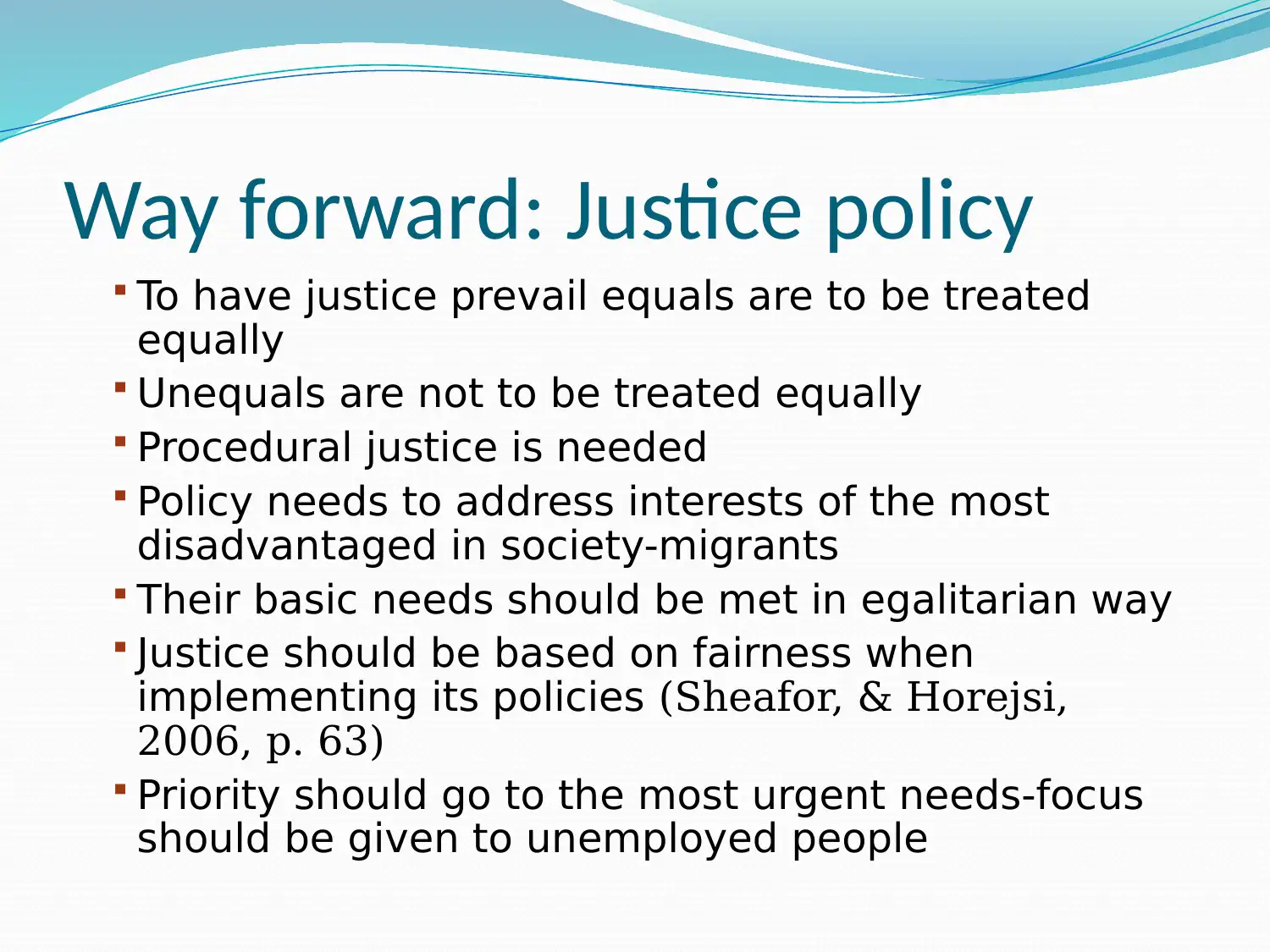
Way forward: Justice policy
To have justice prevail equals are to be treated
equally
Unequals are not to be treated equally
Procedural justice is needed
Policy needs to address interests of the most
disadvantaged in society-migrants
Their basic needs should be met in egalitarian way
Justice should be based on fairness when
implementing its policies (Sheafor, & Horejsi,
2006, p. 63)
Priority should go to the most urgent needs-focus
should be given to unemployed people
To have justice prevail equals are to be treated
equally
Unequals are not to be treated equally
Procedural justice is needed
Policy needs to address interests of the most
disadvantaged in society-migrants
Their basic needs should be met in egalitarian way
Justice should be based on fairness when
implementing its policies (Sheafor, & Horejsi,
2006, p. 63)
Priority should go to the most urgent needs-focus
should be given to unemployed people
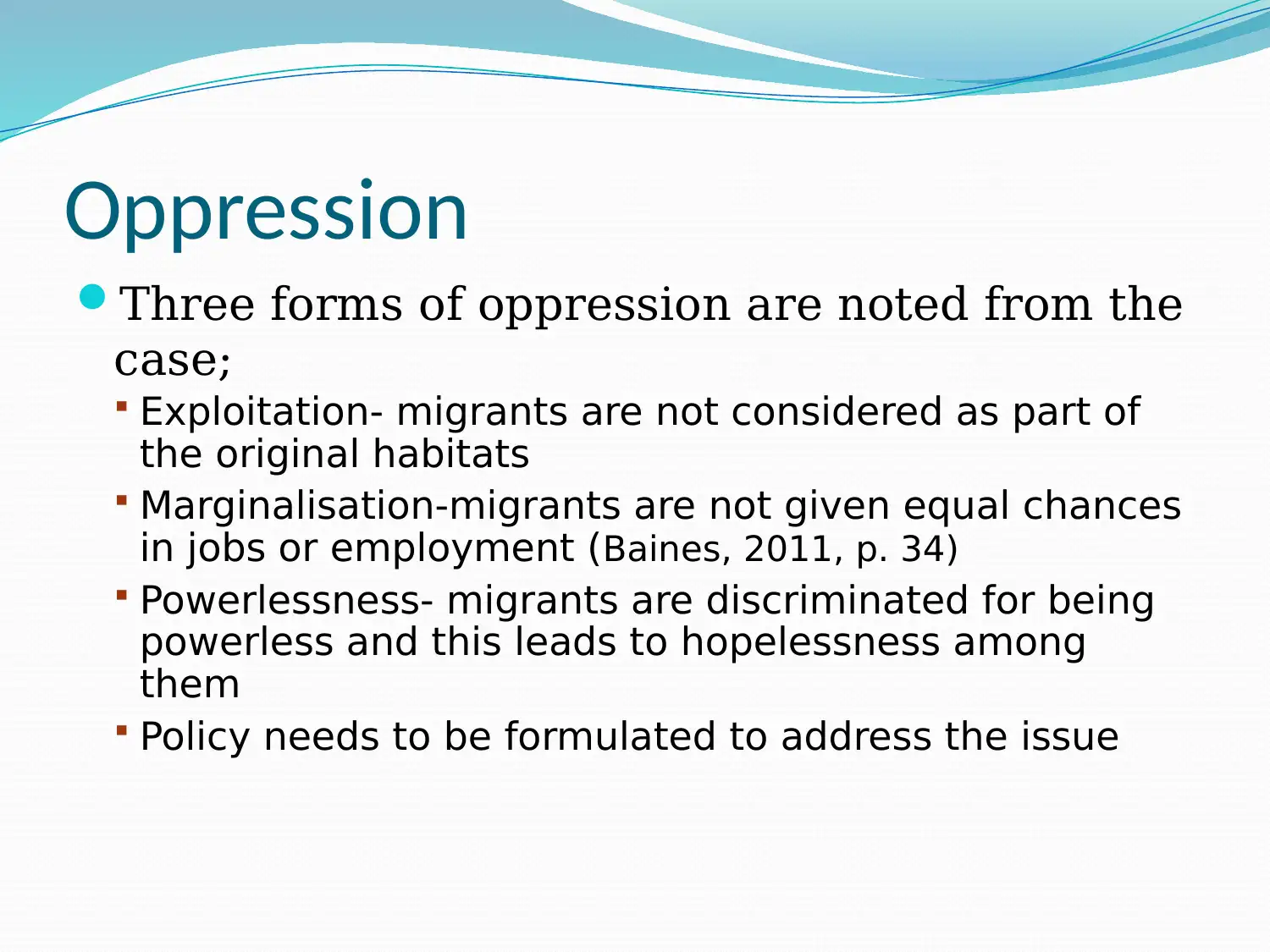
Oppression
Three forms of oppression are noted from the
case;
Exploitation- migrants are not considered as part of
the original habitats
Marginalisation-migrants are not given equal chances
in jobs or employment (Baines, 2011, p. 34)
Powerlessness- migrants are discriminated for being
powerless and this leads to hopelessness among
them
Policy needs to be formulated to address the issue
Three forms of oppression are noted from the
case;
Exploitation- migrants are not considered as part of
the original habitats
Marginalisation-migrants are not given equal chances
in jobs or employment (Baines, 2011, p. 34)
Powerlessness- migrants are discriminated for being
powerless and this leads to hopelessness among
them
Policy needs to be formulated to address the issue
⊘ This is a preview!⊘
Do you want full access?
Subscribe today to unlock all pages.

Trusted by 1+ million students worldwide
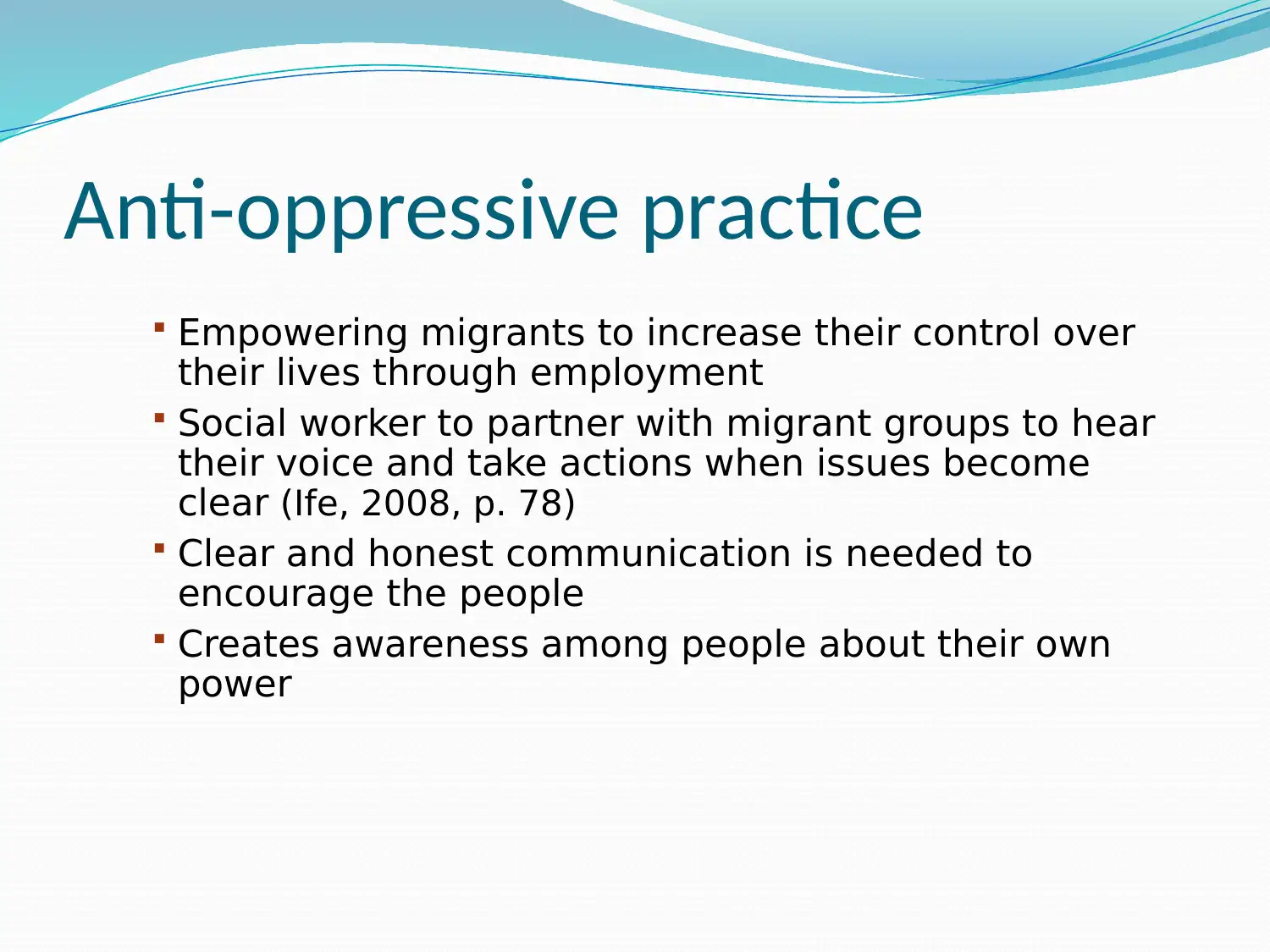
Anti-oppressive practice
Empowering migrants to increase their control over
their lives through employment
Social worker to partner with migrant groups to hear
their voice and take actions when issues become
clear (Ife, 2008, p. 78)
Clear and honest communication is needed to
encourage the people
Creates awareness among people about their own
power
Empowering migrants to increase their control over
their lives through employment
Social worker to partner with migrant groups to hear
their voice and take actions when issues become
clear (Ife, 2008, p. 78)
Clear and honest communication is needed to
encourage the people
Creates awareness among people about their own
power
Paraphrase This Document
Need a fresh take? Get an instant paraphrase of this document with our AI Paraphraser
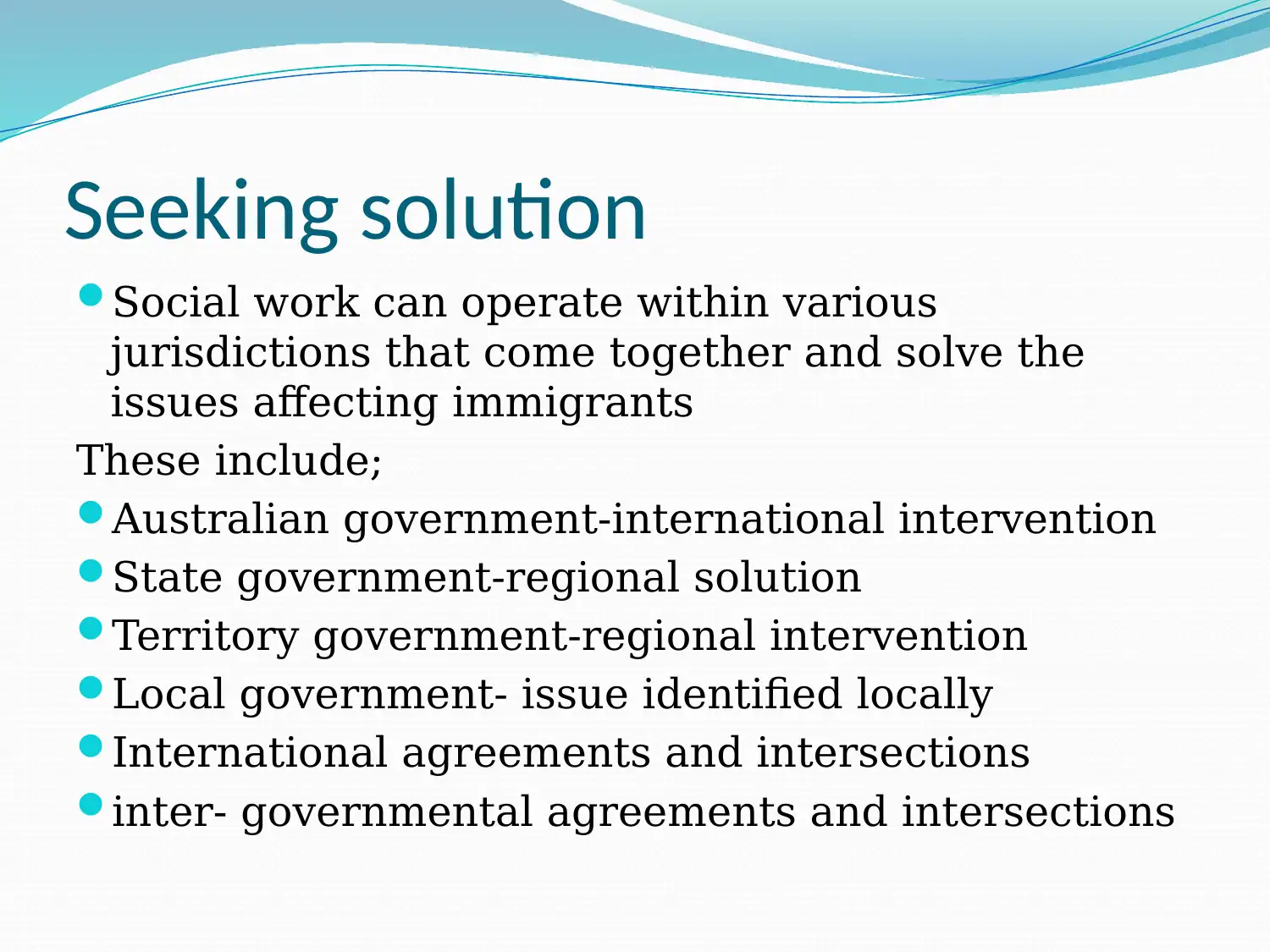
Seeking solution
Social work can operate within various
jurisdictions that come together and solve the
issues affecting immigrants
These include;
Australian government-international intervention
State government-regional solution
Territory government-regional intervention
Local government- issue identified locally
International agreements and intersections
inter- governmental agreements and intersections
Social work can operate within various
jurisdictions that come together and solve the
issues affecting immigrants
These include;
Australian government-international intervention
State government-regional solution
Territory government-regional intervention
Local government- issue identified locally
International agreements and intersections
inter- governmental agreements and intersections
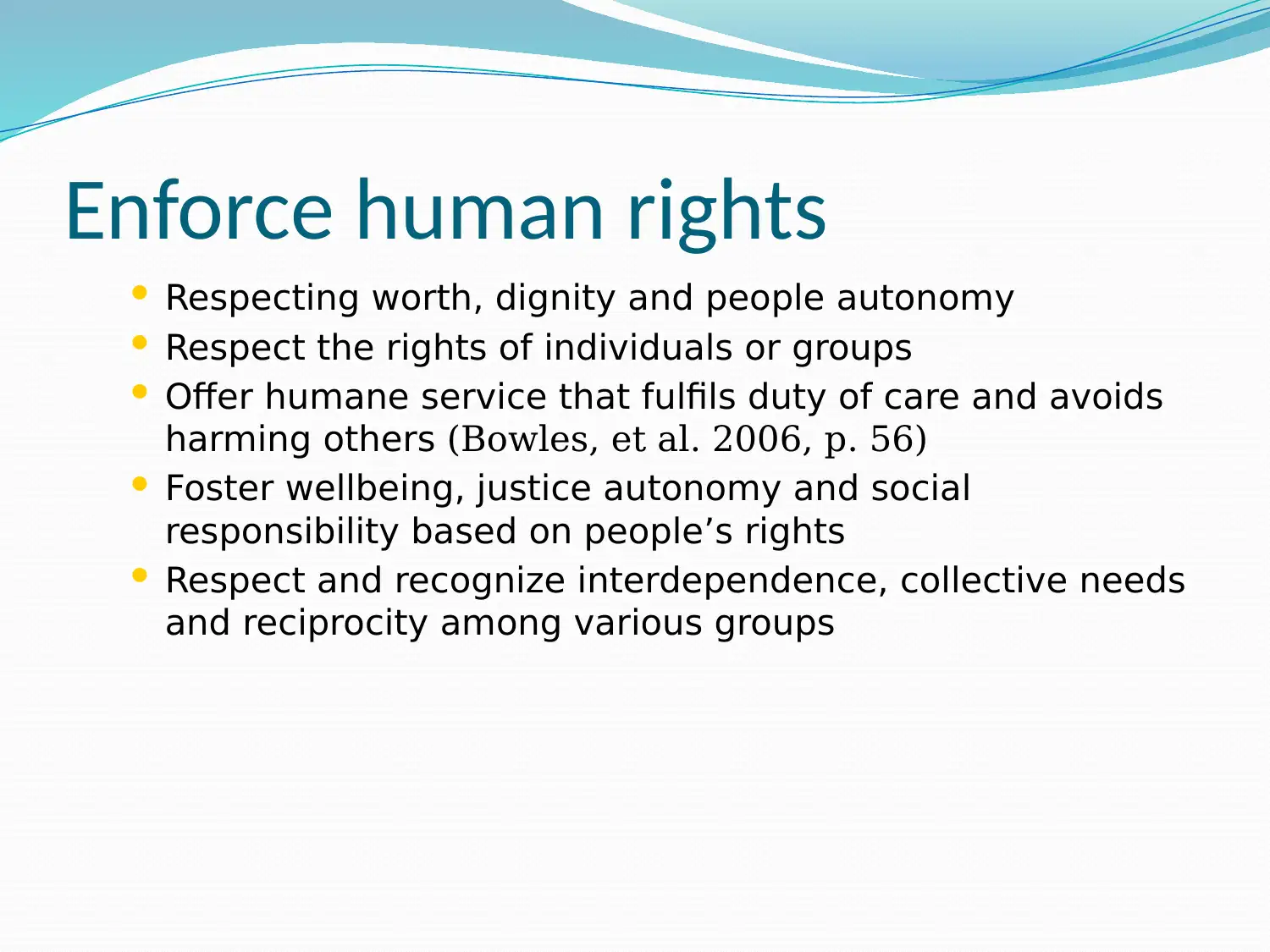
Enforce human rights
Respecting worth, dignity and people autonomy
Respect the rights of individuals or groups
Offer humane service that fulfils duty of care and avoids
harming others (Bowles, et al. 2006, p. 56)
Foster wellbeing, justice autonomy and social
responsibility based on people’s rights
Respect and recognize interdependence, collective needs
and reciprocity among various groups
Respecting worth, dignity and people autonomy
Respect the rights of individuals or groups
Offer humane service that fulfils duty of care and avoids
harming others (Bowles, et al. 2006, p. 56)
Foster wellbeing, justice autonomy and social
responsibility based on people’s rights
Respect and recognize interdependence, collective needs
and reciprocity among various groups
⊘ This is a preview!⊘
Do you want full access?
Subscribe today to unlock all pages.

Trusted by 1+ million students worldwide
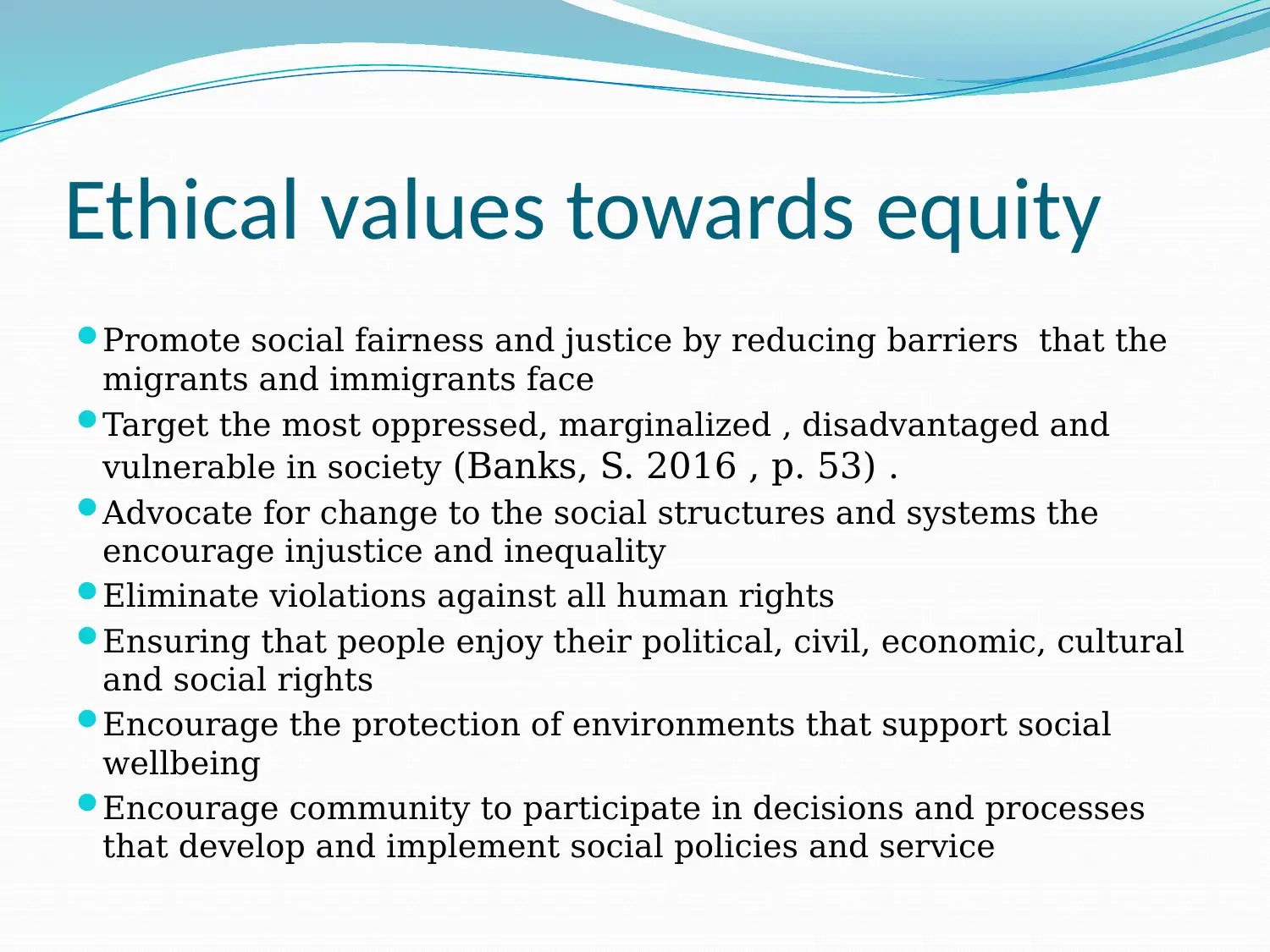
Ethical values towards equity
Promote social fairness and justice by reducing barriers that the
migrants and immigrants face
Target the most oppressed, marginalized , disadvantaged and
vulnerable in society (Banks, S. 2016 , p. 53) .
Advocate for change to the social structures and systems the
encourage injustice and inequality
Eliminate violations against all human rights
Ensuring that people enjoy their political, civil, economic, cultural
and social rights
Encourage the protection of environments that support social
wellbeing
Encourage community to participate in decisions and processes
that develop and implement social policies and service
Promote social fairness and justice by reducing barriers that the
migrants and immigrants face
Target the most oppressed, marginalized , disadvantaged and
vulnerable in society (Banks, S. 2016 , p. 53) .
Advocate for change to the social structures and systems the
encourage injustice and inequality
Eliminate violations against all human rights
Ensuring that people enjoy their political, civil, economic, cultural
and social rights
Encourage the protection of environments that support social
wellbeing
Encourage community to participate in decisions and processes
that develop and implement social policies and service
Paraphrase This Document
Need a fresh take? Get an instant paraphrase of this document with our AI Paraphraser
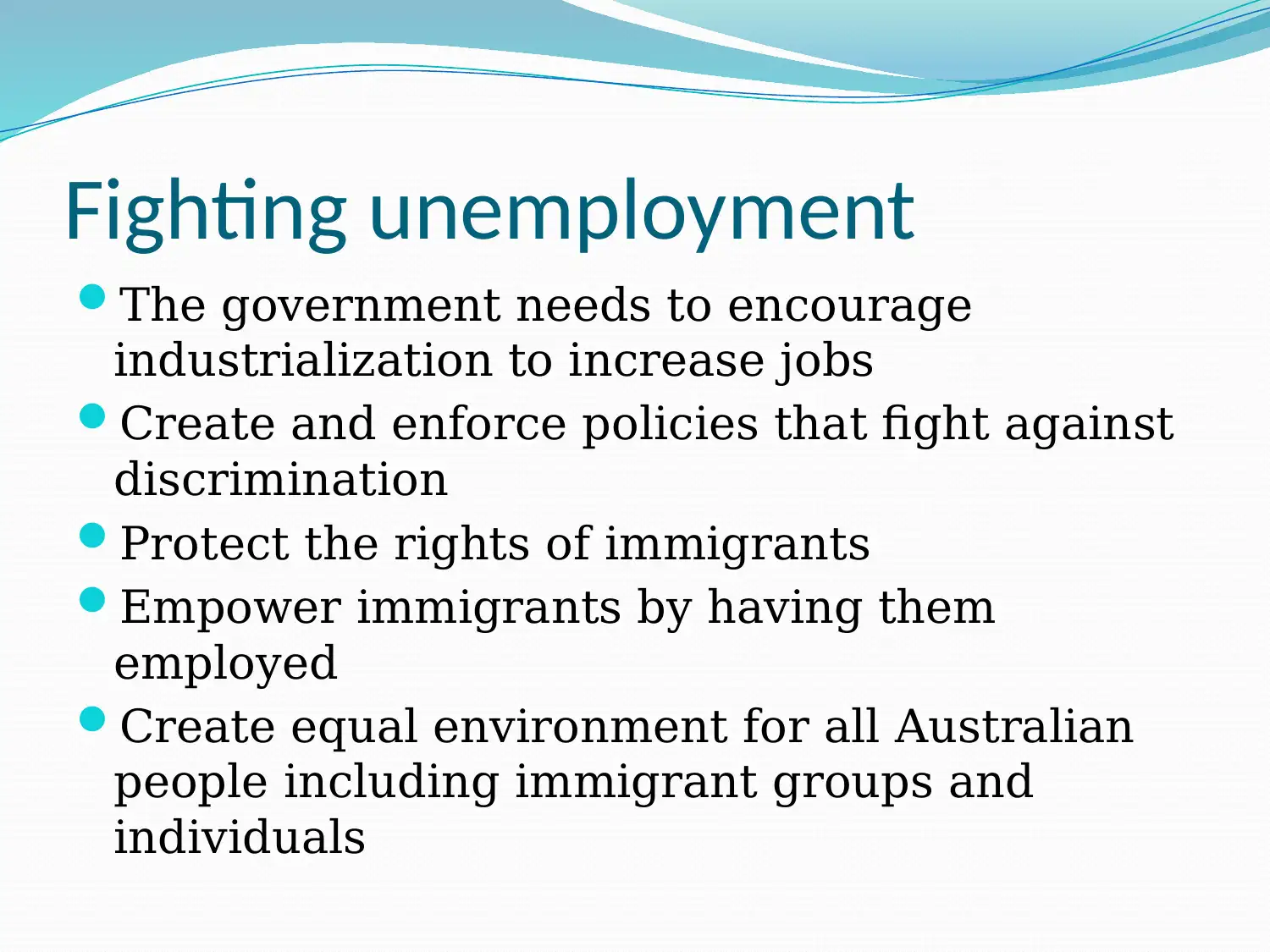
Fighting unemployment
The government needs to encourage
industrialization to increase jobs
Create and enforce policies that fight against
discrimination
Protect the rights of immigrants
Empower immigrants by having them
employed
Create equal environment for all Australian
people including immigrant groups and
individuals
The government needs to encourage
industrialization to increase jobs
Create and enforce policies that fight against
discrimination
Protect the rights of immigrants
Empower immigrants by having them
employed
Create equal environment for all Australian
people including immigrant groups and
individuals
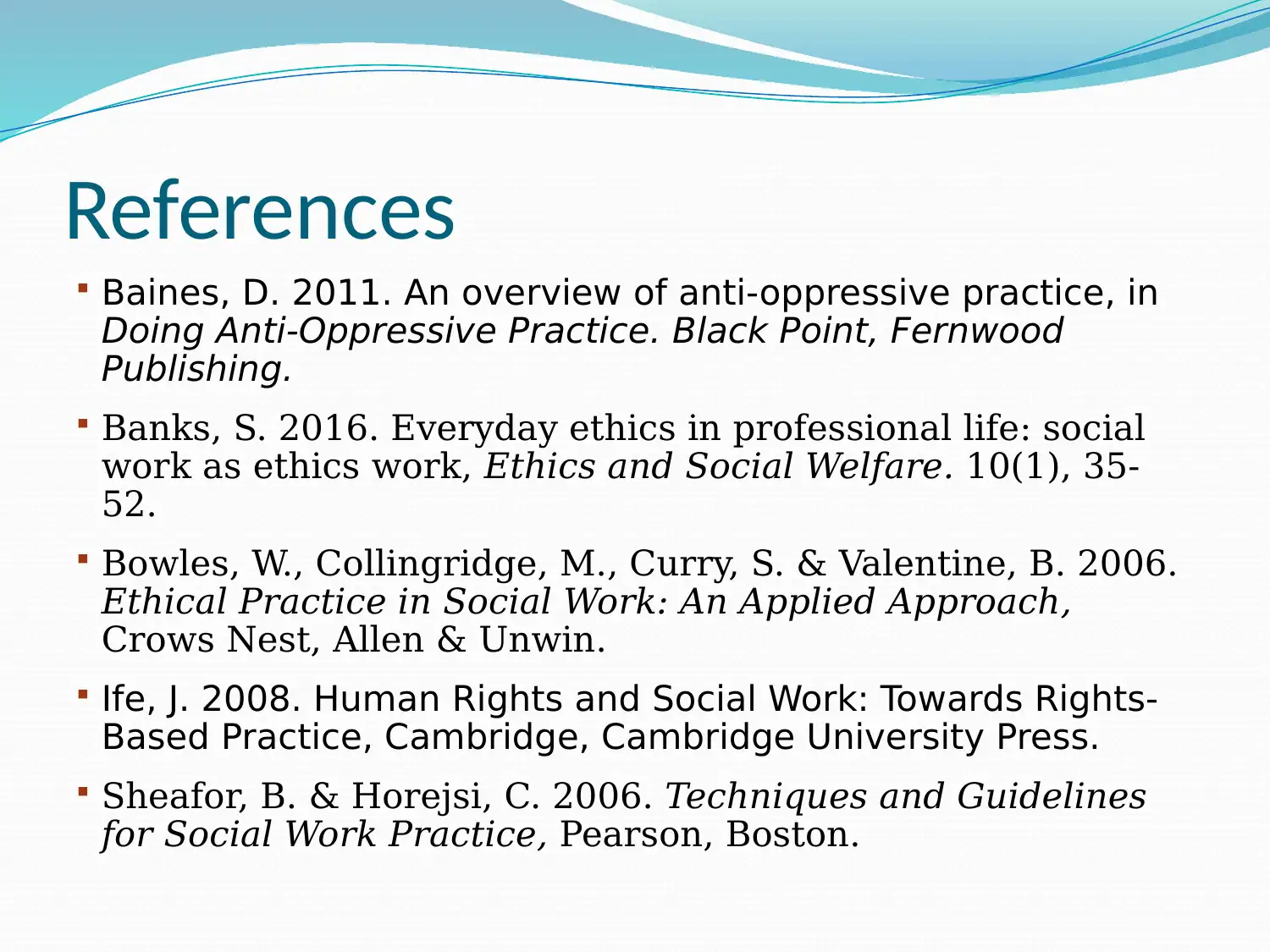
References
Baines, D. 2011. An overview of anti-oppressive practice, in
Doing Anti-Oppressive Practice. Black Point, Fernwood
Publishing.
Banks, S. 2016. Everyday ethics in professional life: social
work as ethics work, Ethics and Social Welfare. 10(1), 35-
52.
Bowles, W., Collingridge, M., Curry, S. & Valentine, B. 2006.
Ethical Practice in Social Work: An Applied Approach,
Crows Nest, Allen & Unwin.
Ife, J. 2008. Human Rights and Social Work: Towards Rights-
Based Practice, Cambridge, Cambridge University Press.
Sheafor, B. & Horejsi, C. 2006. Techniques and Guidelines
for Social Work Practice, Pearson, Boston.
Baines, D. 2011. An overview of anti-oppressive practice, in
Doing Anti-Oppressive Practice. Black Point, Fernwood
Publishing.
Banks, S. 2016. Everyday ethics in professional life: social
work as ethics work, Ethics and Social Welfare. 10(1), 35-
52.
Bowles, W., Collingridge, M., Curry, S. & Valentine, B. 2006.
Ethical Practice in Social Work: An Applied Approach,
Crows Nest, Allen & Unwin.
Ife, J. 2008. Human Rights and Social Work: Towards Rights-
Based Practice, Cambridge, Cambridge University Press.
Sheafor, B. & Horejsi, C. 2006. Techniques and Guidelines
for Social Work Practice, Pearson, Boston.
⊘ This is a preview!⊘
Do you want full access?
Subscribe today to unlock all pages.

Trusted by 1+ million students worldwide
1 out of 12
Related Documents
Your All-in-One AI-Powered Toolkit for Academic Success.
+13062052269
info@desklib.com
Available 24*7 on WhatsApp / Email
![[object Object]](/_next/static/media/star-bottom.7253800d.svg)
Unlock your academic potential
Copyright © 2020–2026 A2Z Services. All Rights Reserved. Developed and managed by ZUCOL.





